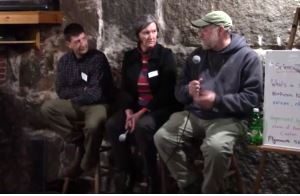The scene: 30 eager faces crowd a small backroom of a pub anxiously onlooking three individuals with microphones. The event begins, holding the throng in attendance at rapt attention from the first word to the last. As the event closes, some of the crowd lingers waiting to get a chance to speak to those who had taken center stage moments before.
Was it the scene of a concert? A reading? Perhaps a poetry slam? No, it was a spectacle of science.
A science café.
Born from the desire to engage and inspire scientific inquiry in the public, science lectures and cafés are not a modern invention. Reports and transcripts of Aristotle and Plato’s public scientific lectures are still reviewed by students in present times. At the dusk of the age of enlightenment, Michael Faraday begun the now famous science Christmas Lectures at the Royal Institution of the United Kingdom. These lectures are ongoing to this day. Science cafés follow in these footsteps, bringing the public and experts together to talk and converse on neutral ground to help invoke curiosity and interest in the sciences.

A Faraday lecture in 1885 Source: http://www.sciencefocus.com/news/christmas-lectures-brief-history
The café held at Biederman’s took this tried-and-true approach, however, it included a spin not many were expecting: the inclusion of ethics in the discussion.
The topic of the night was all about the Northern Forest of New Hampshire, an area sparsely populated and arguably in the midst of an identity crisis. Industries which dominated the landscape for the past century, mainly logging, are on the decline and how the region will adapt to the future is up for speculation. To aid in that speculation were experts Anne Duncan Cooley, Dr. Brian Eisenhower, and Ken Desmarais representing the fields of regional economic development, sociology, and forestry management respectively.
As the audience asked a scope of questions ranging from the future of the forestry industry in the region to how the cultural identity was influencing development of the region. As I was the designated camerawoman for the event, it was hard to take everything in while still keeping everyone in frame, however one question stood out to me. A graduate student pointed out how “brain drain” was occurring in New Hampshire, and asked the panel what was being done to help keep young people in the region. This was the panel’s response:
As both a participant and facilitator of this science cafe, I walked away from it both hopeful and proud. The cafe proved that people do still care about science and the discussion of it. There are inquisitive minds who are invested enough in their pursuit of knowledge to come to a pub and talk with people who are experts in the subject. It has reinforced my belief that in making science more accessible to all, it will only enhance the discipline by bringing in more minds, perspectives, and backgrounds. Though Aristotle and Plato may have been wrong on many of their theories, their method of discussing science with the public seems just as important now centuries later as it was back then.

